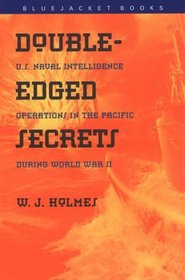I am totally engrossed by books about the breaking of codes during World War II and other conflicts. These books often explain the Why of What happened in conflicts. When he can read the enemy's plans, it gives any general or admiral a giant step up in the competition of warfare. So many of history's "great commanders" wouldn't have been so great if not for knowing in advance the enemy's order of battle, his intentions and his weaknesses.
The breaking of the Japanese codes, as described in this book, was just as important in determining what the Nazis were doing as it was for the Japanese.
What helps give this book a 5-Star review is the author was a member of the code-breaking team. He didn't break them himself, but was heavily involved in the analysis and distribution of information derived from the codes to the people who needed that information. This was particularly true for the U.S. submarines which destroyed the Japanese merchant fleet which supplied the Japanese with raw materials and essential supplies, as well as troops. Individual submarines sunk transports carrying thousands of Japanese troops which then never got to fight American forces.
Even after reading numerous other books on the "Code Wars," I was surprised to find even more answers to "Why" from this book by an insider. For example, one message indicated the Japanese Navy planned to use their now almost plane-less aircraft carriers as diversions for the American to attack and let the Japanese surface fleet achieve victories. When sent out to the admirals commanding the American fleets, Admiral Spruance listened and refused to leave the embarkation ships undefended in one campaign, whereas Admiral Halsey ignored it at Leyte Gulf, went off to sink useless Japanese carriers and left the entire embarkation fleet undefended. If it hadn't been for destroyers and thin-skinned escort carriers throwing themselves against Japanese battleships, the invasion of Leyte would have been a major disaster for the U.S. forces. God alone knows how many tens of thousands of serviceman and women would have been killed. So much for Halsey being a great admiral.
The breaking of the Japanese codes, as described in this book, was just as important in determining what the Nazis were doing as it was for the Japanese.
What helps give this book a 5-Star review is the author was a member of the code-breaking team. He didn't break them himself, but was heavily involved in the analysis and distribution of information derived from the codes to the people who needed that information. This was particularly true for the U.S. submarines which destroyed the Japanese merchant fleet which supplied the Japanese with raw materials and essential supplies, as well as troops. Individual submarines sunk transports carrying thousands of Japanese troops which then never got to fight American forces.
Even after reading numerous other books on the "Code Wars," I was surprised to find even more answers to "Why" from this book by an insider. For example, one message indicated the Japanese Navy planned to use their now almost plane-less aircraft carriers as diversions for the American to attack and let the Japanese surface fleet achieve victories. When sent out to the admirals commanding the American fleets, Admiral Spruance listened and refused to leave the embarkation ships undefended in one campaign, whereas Admiral Halsey ignored it at Leyte Gulf, went off to sink useless Japanese carriers and left the entire embarkation fleet undefended. If it hadn't been for destroyers and thin-skinned escort carriers throwing themselves against Japanese battleships, the invasion of Leyte would have been a major disaster for the U.S. forces. God alone knows how many tens of thousands of serviceman and women would have been killed. So much for Halsey being a great admiral.




